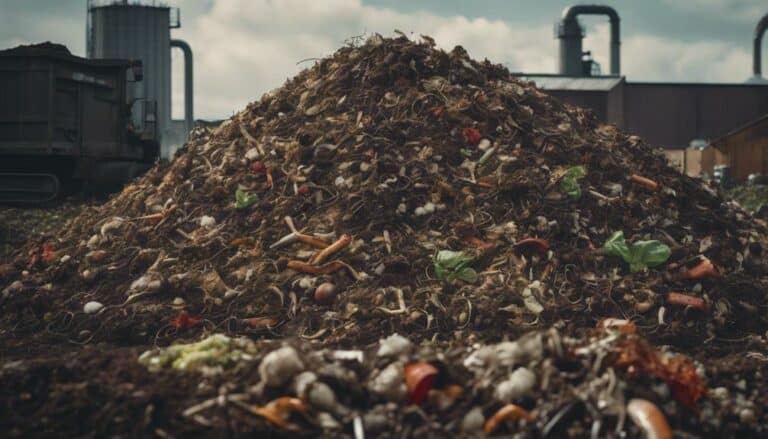Converting organic waste into bioenergy using anaerobic digestion creates electricity and cuts greenhouse gas emissions. The process decomposes waste with microorganisms to produce methane-rich biogas. This biogas, mainly composed of methane and carbon dioxide, can power electricity-generating systems. By transforming waste into energy, methane emissions decrease and waste management improves. A circular economy benefits from this revenue-generating process. Bioenergy from organic waste becomes a renewable energy source, lessening odors, pathogens, and water pollution risks. Embracing this method aligns with sustainable practices and supports a circular economy model. This solution positively impacts both the environment and energy generation.
Key Takeaways
- Organic waste is converted into bioenergy through anaerobic digestion.
- Biogas production reduces methane emissions and generates renewable energy.
- Biogas systems recycle organic materials into valuable energy and soil products.
- Bioenergy from organic waste aids in sustainable resource management.
- Converting waste into bioenergy helps in reducing the carbon footprint and reliance on fossil fuels.
Biogas Production Process Overview
In the process of generating bioenergy from organic waste, the biogas production process overview showcases the efficient conversion of organic materials into valuable methane-rich gas. Through anaerobic digestion, organic waste undergoes decomposition by microorganisms, producing biogas composed mainly of methane and carbon dioxide.
This biogas, a renewable energy source, can be used to generate electricity by burning it in a combined heat and power (CHP) system. The anaerobic digestion process not only helps in recycling organic materials effectively but also plays a significant role in reducing methane emissions, a potent greenhouse gas.
Benefits of Organic Waste Conversion
Utilizing organic waste conversion processes presents a myriad of important benefits for both environmental sustainability and resource efficiency. Converting organic waste into bioenergy plays a vital role in reducing methane emissions, a potent greenhouse gas contributing to climate change. This process not only helps in waste management by transforming waste into valuable energy but also generates revenue from waste products, fostering a circular economy where resources are utilized efficiently.
Additionally, bioenergy derived from organic waste serves as a renewable source of baseload power, diminishing reliance on fossil fuels and aiding in the shift towards cleaner energy alternatives. By converting organic waste into bioenergy, odors, pathogens, and water pollution risks associated with traditional waste disposal methods are also greatly reduced, contributing to a healthier environment and improved public health.
Embracing organic waste conversion for energy production not only addresses waste-related challenges but also promotes sustainable practices and the generation of renewable electricity.
Applications of Biogas Systems
When considering the practical applications of biogas systems, it becomes evident that these systems play a significant role in recycling organic materials into valuable biogas and soil products.
Biogas, primarily composed of methane, carbon dioxide, and trace gases, offers versatile uses ranging from heat and power (CHP) generation to electricity production and biomethane conversion. Co-digestion techniques further enhance biogas yields from organic waste, maximizing the benefits derived from these systems.
Utilizing biogas not only aids in reducing methane emissions but also creates opportunities to generate revenue from waste while contributing to sustainable practices. By integrating biogas systems into waste management strategies, industries and communities can establish a circular economy model that promotes environmental stewardship and economic growth.
Embracing the diverse applications of biogas systems presents a sustainable solution for organic waste management, energy production, and greenhouse gas mitigation.
Current Trends in Anaerobic Digestion
Anaerobic digestion technology continues to evolve, reflecting advancements in sustainable waste management practices and renewable energy production. The process involves converting organic wastes into biogas, a renewable energy source rich in methane. In the United States, anaerobic digestion plants are increasingly being utilized to produce biogas from various organic materials. This biogas can then be used in combined heat and power (CHP) systems to generate electricity, reducing the reliance on fossil fuels. The shift towards utilizing biogas produced from organic waste helps in mitigating methane emissions, a potent greenhouse gas, while simultaneously creating valuable energy resources.
The trend of harnessing biogas from organic waste aligns with the global push towards adopting more sustainable and environmentally friendly energy sources. By utilizing anaerobic digestion technology to convert organic waste into biogas, countries like the United States are moving towards a more renewable energy future, reducing carbon dioxide emissions and fostering a more sustainable approach to waste management and energy production.
Environmental Impacts of Biogas Generation
Generating biogas from organic waste greatly reduces greenhouse gas emissions while providing a renewable energy source, thereby contributing to a cleaner environment and sustainable resource management. The process involves converting organic matter, such as food waste per day, into biogas through anaerobic digestion.
This waste-to-energy conversion not only helps in minimizing greenhouse gas emissions by capturing methane but also aids in decreasing the carbon footprint associated with traditional waste disposal methods. By utilizing organic waste for biogas generation, this practice promotes sustainable resource management by diverting waste from landfills and utilizing it as a valuable energy source.
Biogas production plays an essential role in mitigating climate change effects by offering an environmentally friendly alternative to fossil fuels. Embracing biogas generation not only addresses the environmental impacts of organic waste but also presents a practical solution for sustainable energy production and waste management.
Conclusion
To summarize, the shift from waste to watts through bioenergy generation offers a sustainable solution to organic waste management. By utilizing anaerobic digestion processes, we can efficiently convert waste into valuable biogas for various applications.
This innovative approach not only addresses environmental challenges but also provides a renewable energy source. Embracing this trend in bioenergy production not only benefits our planet but also paves the way for a greener future.

